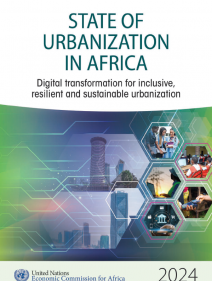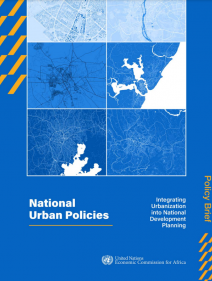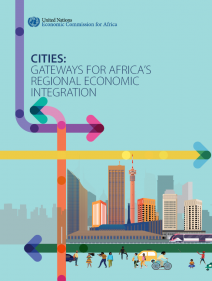Africa’s urban transition
Africa is the epicentre of global urbanization along with Asia. It has the fastest urban growth in the world. The continent’s level of urbanization rose from 35 per cent in 2000 to 43.5 per cent in 2020, and is expected to reach about 50 per cent by 2035. This megatrend will shift Africa’s demography but is also reshaping economic and social development considerably.
Urbanization presents a unique opportunity to accelerate progress towards prosperity in Africa. African cities already drive economic growth generating the bulk of the region’s GDP. Revenues from African cities are critical in financing development although they remain largely untapped. The productive jobs, which Africa urgently needs, are also mainly concentrated in cities. Furthermore, cities and urban agglomerations are also gateways for Africa’s regional trade and economic integration, driving consumption and production of goods. Cities also improve social outcomes by offering better healthcare, education and infrastructure – critical enablers of human development. Importantly, urban areas impact rural areas and agriculture positively through improved access to markets, services and inputs, raising overall productivity and living standards.
As such, good quality urbanization is the foundation for inclusive economic growth that leads to the eradication of extreme poverty and inequality. However, harnessing this potential requires adequate urban planning, management and investments. Currently, African cities face a host of challenges, constraining their productivity and competitiveness. While this is a cause for concern, Africa is still at an early stage of urbanization, which presents a unique but rapidly closing window of opportunity to steer cities in a direction of inclusive growth.
Our work
Guided by the 2030 Agenda for Sustainable Development and the African Union’s Agenda 2063, our strategic focus is on supporting the formulation and implementation of spatially aligned economic policies and investments aimed at leveraging urbanization for economic growth and development. We combine our technical expertise and convening function to assist member States in leveraging the full benefits of agglomeration for job creation, productivity and regional integration. Our approach brings an urban lens into national development, economic and sectoral planning, and regional integration.
Our work is divided into the following three thematic pillars:
1. Urban job creation
Africa is urbanizing rapidly in the context of deficits in productive jobs. In the last two decades, Africa recorded relatively strong but largely job-poor growth with the informal sector dominating most employment. If managed well, cities play a decisive role in reducing poverty by enabling the creation of decent jobs through the expansion of productive sectors of the economy. Under this pillar, we assist member States in fostering linkages between economic sectors and spatial priorities to promote labour and skill-intensive employment and opportunities that meet the diverse needs of African cities, towns and rural areas.
2. Productive cities and urban systems
African cities contribute substantially to their national GDPs, in some cases accounting for about half of the economic output. However, African cities underperform in their economic potential due to poor infrastructure, urban planning and land governance. Additionally, Africa has no or few midsize urban areas where firms and workers could relocate to avoid the inefficiencies of the largest cities, which further constrains productivity levels. To this end, we work with member States in identifying and targeting strategic investments that raise the productivity of cities and metropolitan areas, and that support secondary cities with high growth potential.
3. Cities and regional economic integration
As production and consumption hubs, cities will play a critical role in accelerating regional economic integration through the African Continental Free Trade Area connecting national and regional economies along transport, energy and trade corridors. Through production and consumption linkages, cities matter for regional integration. Anticipating these linkages and linking urban and regional trade policy deliberately is urgent. In this regard, our work assists member States and Regional Economic Communities in mainstreaming urban components into their regional integration policies and investment priorities - in line with the continent’s strategic needs.
Our functions
In support of the above pillars, we offer assistance through the following three core functions:
- Knowledge and evidence generation to inform urban policy design, implementation and monitoring;
- Operational projects to provide technical advisory services to national and local governments on urban policies and strategies; and
- Convening Member States and other stakeholders to facilitate policy dialogue and learning exchange on urbanization.
Recent knowledge products
- Habitat III Africa Regional Report (2016)
- Urbanization and Industrialization for Africa’s Transformation (2017)
- Urbanization and National Development Planning in Africa (2018)
- Leveraging Urbanization for National Development Planning (2018)
- Africa’s Urbanisation Dynamics 2022: The Economic Power of Africa’s Cities
- Regional Commissions report on the progress on the Implementation of the New Urban Agenda (2019-2022)
- Cities: Gateways for Africa’s Regional Integration (2022)
- Leveraging the Urban Dividend in Africa (2022)
- Domestic Resource Mobilization in Africa: The Role of Cities (2022)
- Africa’s Urban Economy (2022)
Recent policy tools
- An Urban Lens in National Development Planning (2018)
- A Harmonized Implementation Framework for the New Urban Agenda in Africa (2020)
- An Urban Lens in Africa’s Regional Integration: A policy toolkit (2022)
- Africa Voluntary Local Review Guidelines (2022)








